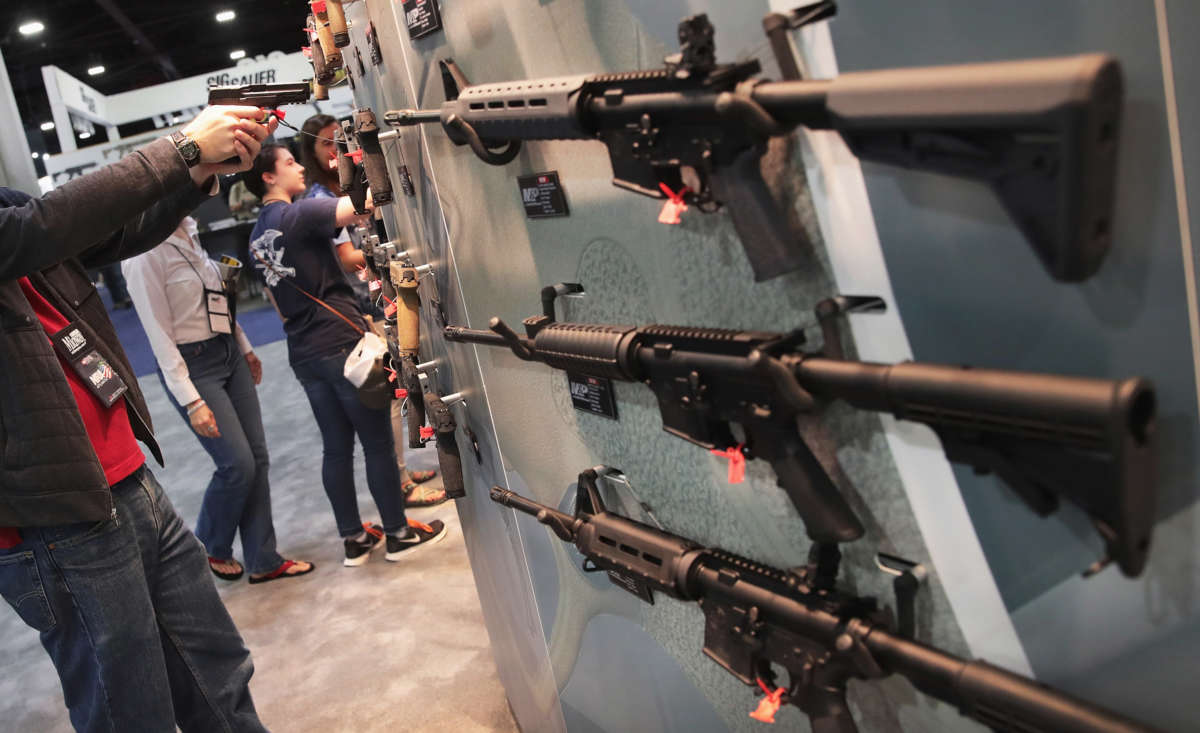Did you know that Truthout is a nonprofit and independently funded by readers like you? If you value what we do, please support our work with a donation.
Survivors and family members of victims of a mass shooting in California from two years ago have won an important court battle, as a San Diego judge has ruled that gun manufacturer Smith & Wesson is not protected by federal law against claims related to a lawsuit filed against the company.
San Diego Superior Court Judge Kenneth Medel dismissed an argument from Smith & Wesson this week in which the gunmaker alleged that it could not be sued because the federal Protection of Lawful Commerce in Arms Act (PLCAA) protects gunmakers and sellers of weapons from legal liability — in most cases — for harm caused by those who use their products to commit crimes.
The lawsuit stems from a mass shooting that occurred at the Chabad of Poway Synagogue in April 2019, in the suburban community of Poway, California, north of San Diego. That shooting resulted in the death of one worshipper and injuries to three others, including an 8-year-old and a rabbi.
In his decision, Medel ruled that PLCAA protections do not apply because exceptions under that law permit lawsuits to move forward if gun manufacturers or sellers violate state law. The lawsuit in question alleges Smith & Wesson violated California state law by designing the weapon used in the shooting to be easily modified to essentially become an assault weapon.
The suit from the plaintiffs in the case also alleges that marketing was used by the gun manufacturer that “attracted impulsive young men with military complexes who were particularly likely to be attracted to the unique ability of AR-15 style weapons,” and further appealed to those with high potential of becoming mass shooters.
“Today’s judgment is a victory, and an important step on the road to justice for the victims of the shooting at Chabad of Poway Synagogue, and all Americans who believe that the gun industry is not above the law,” Jonathan Lowy, the lawyer for the plaintiffs, said in a statement to Reuters. “We look forward to proving our case in court, and working to prevent future tragedies.”
Lawsuits such as these can help dissuade gun manufacturers’ propensity to produce large quantities of weapons that result in mass shootings and other acts of violence, according to Ramsin Canon, a labor, employment, civil rights and land use attorney.
“The pain of mass shootings is borne by victims, their families and communities, and the public. Meanwhile, the gun industry is consistently ramping up production — there are currently about 400 million guns in circulation in the United States, a country of 330 million,” Canon wrote in an article for Truthout earlier this year. “Getting guns into circulation quickly is an acknowledged part of the strategy of undercutting regulatory efforts.”
But with PLCAA still in place, lawsuits like these — and therefore, actions that would result in the slowing down of weapons production — would remain difficult to file, making such efforts to reduce gun violence less likely to be successful.
“The most plain way to impose a cost on the gun manufacturing industry is repealing the Protection of Lawful Commerce in Arms Act (PLCAA) and subjecting the industry to public nuisance and public health theories of liability,” Canon said. “These strategies would begin to compel the industry to bear actual, constant and proportional costs of its reckless overproduction and marketing of arms.”
A terrifying moment. We appeal for your support.
In the last weeks, we have witnessed an authoritarian assault on communities in Minnesota and across the nation.
The need for truthful, grassroots reporting is urgent at this cataclysmic historical moment. Yet, Trump-aligned billionaires and other allies have taken over many legacy media outlets — the culmination of a decades-long campaign to place control of the narrative into the hands of the political right.
We refuse to let Trump’s blatant propaganda machine go unchecked. Untethered to corporate ownership or advertisers, Truthout remains fearless in our reporting and our determination to use journalism as a tool for justice.
But we need your help just to fund our basic expenses. Over 80 percent of Truthout’s funding comes from small individual donations from our community of readers, and over a third of our total budget is supported by recurring monthly donors.
Truthout has launched a fundraiser to add 500 new monthly donors in the next 9 days. Whether you can make a small monthly donation or a larger one-time gift, Truthout only works with your support.
